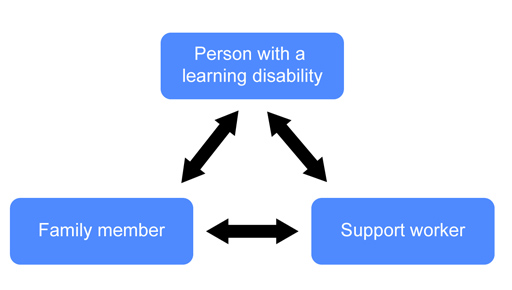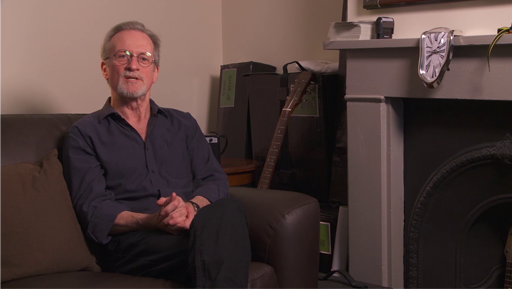5 Choice and conflict
So far in this course, you have seen some of the strains that families experience when relatives have a learning disability. Here you will explore what happens when you bring paid supporters into the picture.

Figure 3 places the person with a learning disability at the top. His or her well-being relies on the family and support worker working in harmony.
This can be quite a difficult set of relationships. The mothers, fathers, sisters and brothers of people with learning disabilities (family carers) bring with them their own history of experiences, some good, some difficult and painful. When relatives reach adulthood, they have to deal with a whole new set of services, social workers and support staff. When these go well, they can be greatly valued by the family and help to improve the lives of the service user. When they go badly, and tensions and conflicts develop, everyone suffers.
Difficulties can arise when families see their disabled relative as having a younger developmental age, whereas staff wish to acknowledge them as autonomous adults. Owen, who you met in Section 1, acknowledged that his views changed when he became responsible for his sister Dora.
I recall all the comments that my parents used to say: Make sure Dora is okay; Dora must be looked after. All these thoughts come back to me and it does get a bit scary when you've eventually got to take the leap. The carer doesn't believe that anybody else can care for that person as well as they can. That was certainly the view of my parents and when I was younger I used to think how silly they were. But now that I'm in exactly the same position as my parents were in, I can see exactly what they meant.
A good three-way relationship between the person with a learning disability, their family and the support staff who look after them is important, but not always easy to achieve. The next activity illustrates some of the tensions.
Activity _unit4.5.1 Activity 4 What should Dora wear?
Watch Video 4 in which you hear Owen talk about the clothes that Dora wears. Owen thinks that staff should encourage Dora to wear clothes that don’t make her look like ‘a clown’. As you watch note down the case for and against Owen’s view.

Transcript: Video 4
Answer
For
- People are less likely to notice Dora.
- People are less likely to poke fun at Dora.
Against
- Dora is an adult and should be able to make up her own mind about her clothes.
- Who, other than Dora, is to say what is and is not acceptable? Ian, a self-advocate with learning disabilities who reviewed this course, commented: ‘No one should tell someone else what to wear. What’s wrong with her clothes?’
It is a simple thing to say people have a right to choose what to wear. But the devil is, as so often, in the detail. What does ‘choice’ mean? Where it is assumed, rightly or wrongly, that a person with a learning disability does not have the ability to make sensible decisions, then the scene is set for conflict between the people who believe they know what is best for that person.
